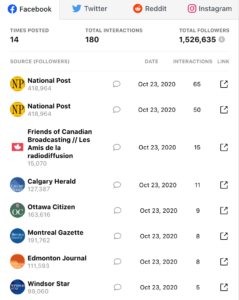Last week, News Media Canada, the lobby group representing the major Canadian news media publishers, released a report calling for the creation of a government digital media regulatory agency that would have the power to establish mandated payments for linking to news articles on social media site, establish what content is prioritized on those sites, and potentially issue fines in the hundreds of millions of dollars. As I noted in my review of the report, it inaccurately describes the proposed Australian approach upon which it is modelled, avoids acknowledging that payments would be for links, and would open the door to hundreds of millions on tariff retaliation by the US under the USMCA.
The report was widely covered by the publishers promoting it: the National Post devoted its front page to the report, the other Postmedia papers all found time to cover the release, and the Toronto Star ran multiple articles and opinion pieces on it. In addition to the front page of some newspapers, the papers themselves posted the stories on Facebook, often multiple times. For example, the National Post front page story was posted 11 times by Postmedia papers including posts from the National Post (twice), Calgary Herald, Ottawa Citizen, Montreal Gazette, Edmonton Journal, Windsor Star, London Free Press, Vancouver Sun, Regina Leader-Post, and Saskatchewan StarPhoenix. The National Post also ran a story in the Financial Post on the report which posted on Facebook, a Diane Francis opinion piece on the report which it posted on Facebook, and a story on what happens when a local newspaper dies, which it posted twice on Facebook. In fact, just this morning, there is yet another op-ed in support of the report by Jerry Dias, which appears in both the National Post and Ottawa Citizen, with both immediately posting to Facebook.
The rest of the Postmedia family was also active in promoting the story. The same National Post primary story was also published in the Ottawa Citizen (posted to Facebook), Calgary Herald (posted to Facebook), Sudbury Star (posted to Facebook), Kingston Whig-Standard (posted to Facebook) Chatham Daily News (posted to Facebook), the Stratford Beacon-Herald (posted to Facebook), North Bay Nugget (posted to Facebook), the Woodstock Sentinel-Review (posted to Facebook), the Cornwall Standard-Freeholder (posted to Facebook), and Sarnia Observer (posted to Facebook). The Toronto Sun ran an opinion piece from Brian Lilley, which was posted to Facebook by both the Sun and Lilley. The Lilley column also ran in the Saskatoon StarPhoenix (posted to Facebook). The Ottawa Citizen ran its own story (posted to Facebook) and the local newspaper dies story and posted to Facebook. The Montreal Gazette ran the Ottawa Citizen story on the report and posted it to Facebook.
The full scope of the Postmedia lobbying campaign is remarkable. The same front page story that appeared in the National Post also appeared in ten additional papers. But even more notable was the emphasis on posting the article to Facebook, where Postmedia’s various Facebook pages posted a link to the article an astonishing 21 times.
As for impact, consider data from CrowdTangle. As noted above, Postmedia posted the original National Post article 11 times on Facebook.

CrowdTangle screenshot, https://nationalpost.com/news/canada/canadian-publishers-call-on-ottawa-to-force-big-tech-to-pay-for-news
There were only three other public posts of that article, which generated 16 total interactions ((likes, comments or shares). The article was publicly and privately shared 62 times. The article in ten other papers garnered only two other public posts and only 8 public interactions across all FB posts. Those articles were only shared 26 times.
| News Source |
Public Posts (in addition to paper) |
Public Engagement from Paper FB Post |
Total Public and Private Shares |
| Ottawa Citizen | None | 18 of 18 | 0 |
| Calgary Herald | None | 9 of 9 | 0 |
| Sudbury Star | None | 2 of 2 | 3 |
| Kingston Whig-Standard | None | 11 of 11 | 2 |
| Chatham Daily News | None | 10 of 10 | 4 |
| Stratford Beacon Herald | 1 | 7 of 8 | 4 |
| North Bay Nugget | None | 11 of 11 | 6 |
| Woodstock Sentinel-Review | None | 2 of 2 | 1 |
| Cornwall Standard-Freeholder | None | 28 of 28 | 3 |
| Sarnia Observer | 1 | 4 of 11 | 3 |
In sum for the the 21 Facebook posts, Postmedia garnered only five additional public posts and a total of 88 shares or just over four shares per post.
If the Toronto Star is your preferred media source, it ran a major story on the report, which it posted to Facebook. It also ran an opinion piece from Navneet Alang, which was posted to Facebook. There was also a Toronto Star editorial board editorial supporting the report and pubic editor column, neither of which were posted by anyone to Facebook and which have each been shared a total of five times on the platform. The public editor column also appeared in the Peterborough Examiner, however, and it was posted to Facebook. The main Toronto Star story was also published in the Peterborough Examiner and posted twice to Facebook, YorkRegion.com (posted to Facebook), and Toronto.com (posted to Facebook).
Some of Canada’s smaller news publishers who are members in News Media Canada were also active in promoting the release. For example, the Telegraph-Journal, part of the Brunswick News group, ran a two op-eds (and one from Jerry Dias) in support of the report (both of which were posted to Facebook). The Abbotsford News, part of the Black Press group, covered the report (and posted to Facebook). There were some exceptions: the Globe and Mail ran one story without posting it to Facebook as did Le Devoir.
What is notable about the self-interested media campaign is not just the power of large Canadian publishers to re-use the same coverage in markets across Canada both big and small, but that under their proposal, they argue that Facebook should be required to pay them for including links to their articles that they themselves have posted. In fact, the lobby group also demands that their original content should be prioritized on Facebook (with a regulator to determine what is entitled to priority), even though the same, original content is repeated again and again across multiple papers and in dozens of Facebook posts. Canadian Heritage Minister has described Facebook as “immoral” for linking to content without payment, but in light of what actually takes place, the comment might be better directed at lobbying campaigns that demand payments for content that the media lobby posts itself to social media.








News organizations are undermining themselves by lobbying the government for a link fee. Legitimate questions about the objectivity of articles critical of Facebook or supportive of the government will arise because of the lobbying. It will be harder to withstand government pressure if news organizations become financially dependent on government mandated payments – who wants to bite the hand that feeds them.
News organizations also need to answer what comes next if they get this legislation. Will they start arguing that the link fee needs to be progressive – tiered rates based on: the linker’s number of friends or followers; the circulation of the newspaper; and the prominence of the article (front page vs stuck in the middle of the paper). How about also charging a fee every time a link is clicked.
Who else will they want to pay. Will they want to expand link fees to links in email and text messages. Will they want device manufacturers to pay for every link posted from an iPhone or Android phone. The possibilities are endless and all it will take is for news organizations and government to become BFFs.
I get more shares than that on shitposts haha
Pingback: ● NEWS ● #MichaelGeist #copyright ☞ Where is Canada’s News Media Lo… | Dr. Roy Schestowitz (罗伊)
Pingback: Links 28/10/2020: Torvalds on Succession, PyTorch 1.7.0 | Techrights
Pingback: Online & Digital Media News - TVA Sports moves to digital-only sportscasts - Broadcast Dialogue
Pingback: The Weekly Briefing - Broadcast Dialogue
Pingback: Snippet Wars: Phoney claims of content theft against Facebook and Google :
Pingback: News of the Week; October 28, 2020 – Communications Law at Allard Hall
Pingback: As It Signs a Deal to Pay Publishers in France, Google Threatens to Pull Search From Australia — Pixel Envy